|
2
A madman has stolen Abraham's dagger and avducted the governor's daughter.
Adrian solves the madman's codes and starts searching for the dagger and the girl.
Damascus gate
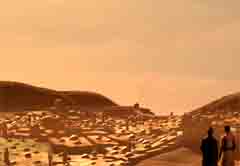 Ozdemir takes Adrian to Jerusalem, the Holy City for each of the three great religions.. Ozdemir takes Adrian to Jerusalem, the Holy City for each of the three great religions..
The Jews say it is the city of King David and the site of Solomon's temple, the sanctuary of the Ark of the Covenant.
The Christians say it is the city of Christ's Passion.
The Moslems say it is the city where Mohammed was carried off by a winged Mare with a woman's face to join Allah.
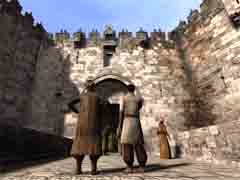 Talk to Ozdemir about the walls and the guards. Talk to Ozdemir about the walls and the guards.
The ruler Sulaiman the Magnificent (called Soliman in the game) of the Ottoman dynasty, has ordered many constructions here, fountains, a new facade for the cathedral of the Rocks, a hospice and the reconstruction of the city walls because a city such as this is never safe from Bedouin attacks and even a new crusade. Under his reign the three great religions live in peace though on a fragile balance
The entrance is guarded by Janissaries. They are Christian children brought up in conquered lands and raised as fighting monks. They are supporters of the empire but Ozdemir worries that their power has become too great.
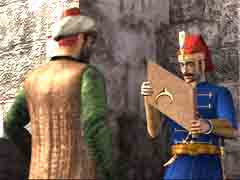 They go to the entrance and Ozdemir presents his credentials to the guard and tells him he is Shavush to his highness Soliman, They go to the entrance and Ozdemir presents his credentials to the guard and tells him he is Shavush to his highness Soliman,
He tells Adrian that a Shavush is an emissary from the holy port.
He works for his highness Soliman and is sent to Jerusalem to assist the governor who finds himself in an embarrassing situation.
At the excavations that were dug for the reconstructions of the city walls they found a chest with an old dagger said to be the one that Abraham brandished when he was told to sacrifice his son. Now there is a quarrel between the millets, who is to guard this dagger which is considered as a holy relic.
Garrison Gardens
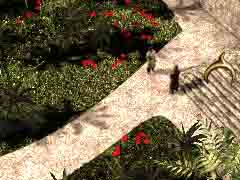 When you come to theCitadel Gardens you can talk to Ozdemir. Ask all questions possible. When you come to theCitadel Gardens you can talk to Ozdemir. Ask all questions possible.
Millets is the name given to different religious communities that cohabit under ottoman law.
The Governor is an administrator and a judge. He refers to the Sunna which is Islamic tradition as laid down by the Prophet in the Koran, but also by the example of his life.
Abraham was told by God to sacrifice his son as proof of his faith. In the last minute an Angel intervened and a sheep was offered instead of one of Abraham's sons.
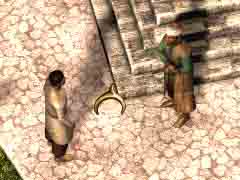 Ozdemir says sons because for Moslems Abraham was told to sacrifice Ishmael even though in the Bible the victim is described as Isaac.
Ozdemir says sons because for Moslems Abraham was told to sacrifice Ishmael even though in the Bible the victim is described as Isaac.
Ishmael was the firstborn. Ishmael's mother was an Egyptian woman Agar, ancestor of the Arab people, a servant in Abraham's house.
Isaac was born to Abraham's wife Sarah just as she turned 90. Her name means "laugh" because when she learned that she was going to have a child at such an old age, she was filled with joy.
Arabs and Jews thus share the same ancestors and the same blood.
Ozdemir also tells Adrian about the man they are going to meet.
"He is an old comrade in arms of our emperor.
Allah tested him greatly, his four sons perished so that our flag may fly at the Ramparts of Budapest.
Layla his second wife, died also. All he has left is his daughter Hykmah. Now he lives only for her and his duty."
A man called Ibrahim comes and greets them and takes them to the Governor. Ozdemir introduces Adrian as his interpreter.
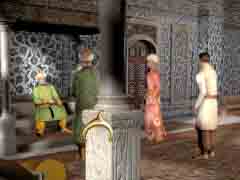 The governor is glad to see Ozdemir but says that he has grave news for him. The governor is glad to see Ozdemir but says that he has grave news for him.
"Abraham's dagger has been stolen from within these walls not more than an hour ago.
The only thing that could wipe away the shame that overwhelms me is the despair that grips my being. He who committed this crime also took Hykmah, my only daughter."
Ozdemir asks who could have been so foolish as to have perpetrated such crimes and is told that it is a fanatic, a sort of preacher by the name of Hayyat, whom Ibrahim had imprisoned more than a month ago for public disorder. But now the man has vanished and with him the dagger and Hykmah"
Ozdemir asks where he was held and the governor tells Ibrahim to take them to the prison cell.
The Prison Cell
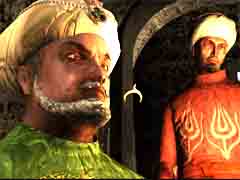 When they get there the governor sees some drawing at the walls and asks about them. When they get there the governor sees some drawing at the walls and asks about them.
Ibrahim said they had given the prisoner some color pigments and thought it would do no harm.
Ozdemir says: "0ur criminal is an artist, he is also a very educated man, he speaks at least three languages, and he is an excellent map maker too. Do you know why he took Hykmah? Has he left some message?
Adrian answers: "I think that the answer is here on these walls. We just need to read this man's madness.
Ibrahim promises to have the city searched and that the man shall not escape for long.
"Find my daughter." says the governor. "I shall be in my Council rooms come and see me if you find out anything. You should consult the Sufi who is studying in the library. He is a wise man. If we fail I shall no longer be worthy of Soliman's thrust.
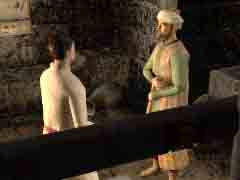 When the governor has left, Ozdemir says: "Well Adrian this is a great challenge for your perceptive mind." When the governor has left, Ozdemir says: "Well Adrian this is a great challenge for your perceptive mind."
Now you can talk to Ozdemir. Ask him about Hykmah, Sufi and Maps.
Adrian thinks that the Governor did not seem overly upset by Hykmah's disappearance.
Ozdemir tells him not be fooled. The Governor is greatly disturbed but his honor demands that nothing should deter him from his duties. He was nominated by Soliman himself and only the emperor can take that duty away from him.
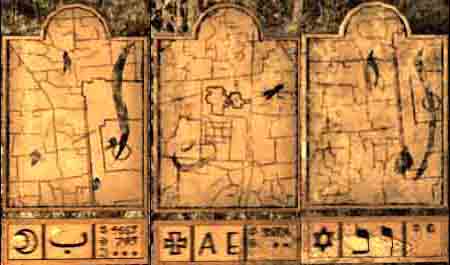 Ozdemir tells Adrian that he has heard very much of Hykmah. She is said to be as beautiful and lively as Layla her late mother. The girl is greatly loved in Jerusalem. Perhaps the madman choose her so his actions would stand out. Perhaps he knew all the millet would miss her presence. Ozdemir tells Adrian that he has heard very much of Hykmah. She is said to be as beautiful and lively as Layla her late mother. The girl is greatly loved in Jerusalem. Perhaps the madman choose her so his actions would stand out. Perhaps he knew all the millet would miss her presence.
The Sufis are spiritual leaders who practice ecstasy and meditation.
They follow their own part, sometimes well outside the precepts of the Revelation of the prophet and the Chari'a., the civil and penal code drawn from the Koran.
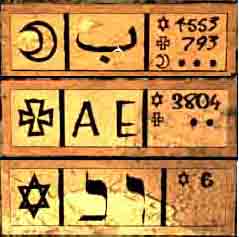 Adrian looks at the drawings and says that they look like parts of a map. Adrian looks at the drawings and says that they look like parts of a map.
Ozdemir confirms that he thinks these maps are districts of Jerusalem.
Click at the drawings.
Adrian comments that there are three boxes of equal size and proportions and Ozdemir confirms that it is called a triptych.
Click at the drawings once again and study them. Adrian says that the black lines seem to run off the streets. Ozdemir answers that they do not appear to indicate a place.
Click at the lower part of the left drawing. Adrian wonders if it is a code bud Ozdemir is as puzzled that he is.
Click at the lower part at the two other drawings and study all three of them carefully-
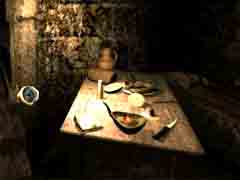 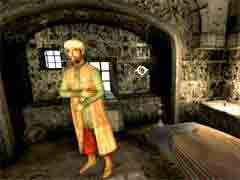 Click at the cage in the alcove behind Ozdemir. Hayyat must have tamed a bird but if so he also freed it in turn when he freed himself. Click at the cage in the alcove behind Ozdemir. Hayyat must have tamed a bird but if so he also freed it in turn when he freed himself.
Click at the door frame to the left of the table at the other side of the room. The lock is not broken.
Either the man is a great lock picker or he escaped when the door was left open, or someone opened it for him.
Leave through the door and walk towards the guard.
The Library
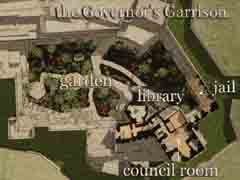 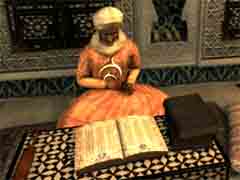 You get a map over the governor's garrison. Search for the library, then click to go there. You get a map over the governor's garrison. Search for the library, then click to go there.
TheSufi is sitting near the back wall. When he sees Adrian he greets him: "Come in dhimmi or stranger if you prefer. Lost one would be more exact. Stranger because you are not from this place and lost because you don't recognize Mohammed as the Prophet of Allah. But you are not damned because you pray to Allah although you give him another name.
Now you can talk to the Sufi. Use all the questions.
He did know Hykmah well and said she is a young girl with as much faith as she has heart
She is demanding and impassioned and funny. And such spirit. Almost to much spirit for a young girl but plenty for a daughter to the governor.
They were friends. Her father encouraged her to follow the Sufi's lessons in the library.
About the Hebrew and Arabic alphabets he says that the letters are holy signs. God used them to pass his words to men. Symbolically they contain part of His strength. But he proposes Adrian to talk of this subject to Youssef al-Bakri the calligrapher who often works in the garden.
The Sufi has talked to the prisoner and says he was a man full of paradoxes.
Sometimes he was as wise as a Patriarch, other times, foolish as a child.
A complex personality but he knew how to make himself loved even by his jailers.
And he received visits, from Hykmah for one.
The Sufi used to play chess with him and considered him a great adversary.
Adrian asks the Sufi if he knows what Hayyat's faith was and why he was so interested in the dagger?
The Sufi thinks he may have been motivated by a single desire, to underscore that which unites the three religions of the book.
The Sufi tells Adrian that he played chess with Hayyat through the bars in his cell. They had agreed that every time Hayyat won, the Sufi would bring him a book.
He read a lot recently. And afterwards he wanted the Sufi to bring him something to write and paint with..
The books Hayyat had asked for were:
The treatise on zoology by Ibn al-Mawsili.
The treatise on optics by Al Haytham
the Book of a Hundred Doors by Isaac Chani
the Pastor by Hermas
and even a conversion table for calendars
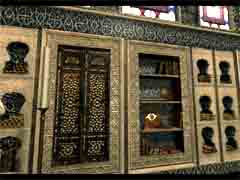 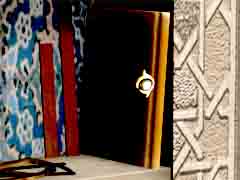 When Adrian wanted to see the conversion tables the Sufi points with his right arm towards the shelves and says:. "It is somewhere on the shelves, It is a large book with a Latin title." When Adrian wanted to see the conversion tables the Sufi points with his right arm towards the shelves and says:. "It is somewhere on the shelves, It is a large book with a Latin title."
Go towards the small table at the other side of the room. Then search on the shelves with your cursor until it gets activated. Click to take the book.
Click at the Sufi to see if you have some questions left. In that case use them.
You'll learn that the Dhimmi are the people of the book whose faith is turned, like the Moslems, to the one and only God. Even though they call him Yahweh, God or Allah.
If they pay the jizya, a specific tax, they get protection and the right to practise their religion on the condition that they do not commit an act of proselytism.
Jewish, Orthodox, Christians, Latin and Armenian Dhimmis come to Jerusalem..
The Sufi thinks this is quite enough to make life a little complicated at times.
About Mohammed the Sufi says that their Prophet, blessed be his name was born in the year 570 of the time of the Nazarenes. He was an ordinary man, a camel driver, to whom the Angel Gabriel gave the mission of being the last carrier of the word of God. Mohammed dictated the Koran under divine inspiration and moved the entire Arabic peninsula from idolatry to the worship of Allah. After his death in 632 the Califs brought the flame of Revelation to Andalusia and Persia, but that is another story.
Leave the Library. When you leave the Sufi says: "Dhimmi you don't seem foolish. I am sure that you will find what you seek, one day."
When you get the map click at the garden.
The Garden
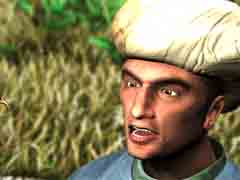 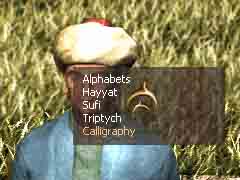 Take a step forward then go through the arch on the left and you'll meet the calligrapher. Take a step forward then go through the arch on the left and you'll meet the calligrapher.
He must have heard about you because he immediately recognizes you as the nazarene translator.
Now you can talk to him. Ask all questions,
He tells you about the alphabets used by the Hebrews and Arabs.
The letters are energy. They are values and quality much more than just simple signs.
But that is also true about the roumis.
The Hebrews brought this art of association up to a very high point of refinement.
They call it Cabala It quickly became extremely complex but it is a powerful tool for meditation. The basic practise involves associating each letter with its position in the alphabet.
He gives Adrian a plate that illustrates how this is done. Study it.
The calligrapher has not met the prisoner.
But he knows that Hayyat received a number of visits,
Ibrahim. The Sufi Isa al Gawry and especially Hykmah the governor's own daughter.
When you ask him if he knows the Sufi he is very upset and tells you not to ever speak of the Sufi.
He says that the day he finally beats him at chess he shall perhaps pardon him for being so intelligent.
Concerning the triptych the calligrapher doesn't think that you could call that art but about his is own art he says: "Tradition has it the calam, instrument of calligraphy, was the first object created by Allah. Whoever holds the calam in accordance with the rules of proportion and harmony is to some extent closer to the secrets of God.
Leave the garden. Turn left and go through the arch, then turn right and go forward. Walk up the stairs and you get the map. Click at to the library to go there.
The Library
Talk to the Sufi. You get the three Holy Books as subjects. Click at Torah. The Sufi says that Torah is a generic term that stands for the five books famed for being written by Moses' very own hand - Genesis, Exodus, Leviticus; Numbers and Deuteronomy. He wants you to precise what you are looking for. You get four circles with Zeros that you can change to other numerals by clicking and dragging. This must refer to the code part of the triptychs.
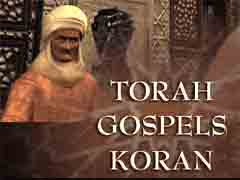 

One of the code parts shows a Star a Mangan David. That must mean the Torah. In the next column there are two letters. Look in the alphabet-table and you can see they also represent the numbers 2 and 6. In the third column you read the number 6.
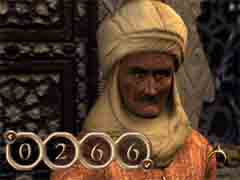 Enter code 0266. Since you only have three numbers leave the zero in the first column. The Sufi goes to the shelf, brings the Torah and shows you the passage you have chosen. He says it talks about Hope.
Hope, the heart of the Alliance between Hebrews and Yahweh their God.. 
 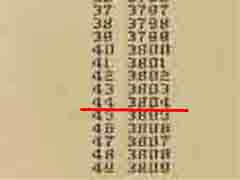

Talk to the Sufi once more. This time choose Gospel. The Sufi says: "Which book do you talk of, that of St. Matthew, St. Mark, St. Luke or St. John."
Look at the code with the cross. A and E represent 1 and 5. In the conversion table you find that the Hebrew year 3804 is the same as the Christian year 44.
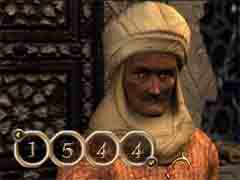 Enter code 1 5 4 4. Enter code 1 5 4 4.
The Sufi shows you the passage you have chosen. It is about Love.
Love, the greatest of all gifts of God to man, the most difficult and demanding too
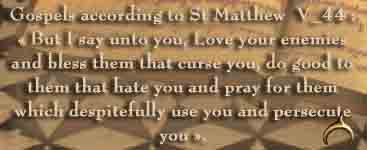
 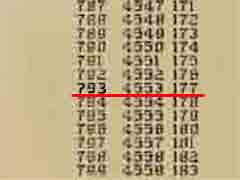
Talk to the Sufi again.  This time choose Koran. The Sufi says: "One hundred and eleven suras make up the Koran my friend. Would you like to read anyone in particular? This time choose Koran. The Sufi says: "One hundred and eleven suras make up the Koran my friend. Would you like to read anyone in particular?
Look at the code with the moon. This time choose the Moslim column in the alphabet-table and you find that the letter in the middle column represents 2.
To find the Moslim year corresponding to the Christian year 793 and the Hebrew  year 4553 look at the conversion calender and page to the right page. You find the year 177. (You must use the calender because a Moslem year is about 10 days shorter than a Christian year and so you can't use simple arithmetic and just subtract 622 years.) year 4553 look at the conversion calender and page to the right page. You find the year 177. (You must use the calender because a Moslem year is about 10 days shorter than a Christian year and so you can't use simple arithmetic and just subtract 622 years.)
Enter code 2 1 7 7.
The Sufi goes to the shelf, brings the Koran and shows you the passage you have chosen.
He says he does not know in the Koran any better way of defining what is Faith.
Faith, Hope, Love.
These are what the Christians call theological virtues. They are common to all three religions.
Even if Hayyat is mad he certainly knows and masters the diversity of the writings.
The Garden
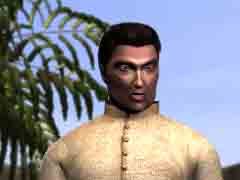
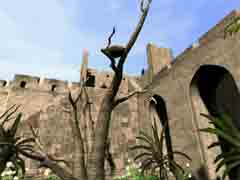 Exit the Library. When you get the map choose Garden. Exit the Library. When you get the map choose Garden.
Go to the calligrapher and talk to him.
Adrian asks if he could write some words on a wall.
He would do anything to please the governor but he has misplaced his glasses.Without them he can be of no help.
Turn right and go forward, then turn right again and go forward to the big tree. There is a bird's nest in the tree. Maybe the bird has taken the glasses. Birds like to steal glittering things. But to get to the nest, you must first get rid of the bird.
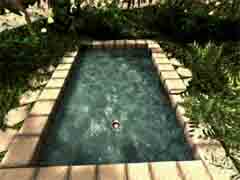
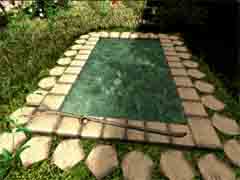 Turn left and go to the pond. There are some stones at the bottom. Click at a stone and Adrian will pick it up and throw it at the bird. The bird flies away. But still you can't reach the nest, you need a stick or something like that. Turn left and go to the pond. There are some stones at the bottom. Click at a stone and Adrian will pick it up and throw it at the bird. The bird flies away. But still you can't reach the nest, you need a stick or something like that.
Return past the calligrapher and go through the arch. Turn left and go forward. Turn left again. There is another pond. Go forward and pick up the branch from the edge of the pond.
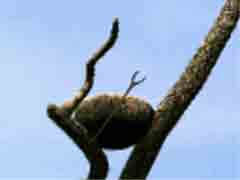
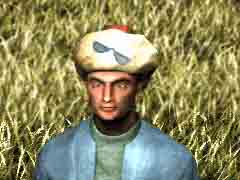 Return to the tree at the other end of the garden. Use the branch on the nest. Adrian takes down the nest and finds the glasses, takes them and carefully replaces the nest in the tree. Return to the tree at the other end of the garden. Use the branch on the nest. Adrian takes down the nest and finds the glasses, takes them and carefully replaces the nest in the tree.
Return to the calligrapher zoom in on him and give him the glasses.
The Prison Cell
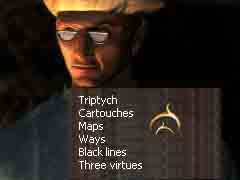
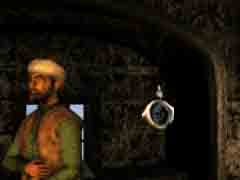 You go together to the prison cell. When you get there a white pigeon comes flying and enters the cage. You go together to the prison cell. When you get there a white pigeon comes flying and enters the cage.
Talk to the calligrapher about everything. He doesn't seem impressed by the paintings and says that it is the work of a holy man, not a calligrapher, but he thinks that they are references to the three holy virtues that are common to all three religions.
Ask him to paint the words hope, faith and love in the boxes.
He thinks the boxes are enormous and want to know exactly where to paint them.
Tell him to keep close to the beginning and end of the lines.
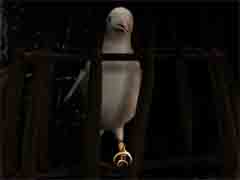
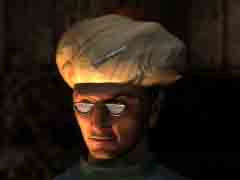 When he is done Adrian is puzzled. Everything seems logical , but the lines of each word could indicate a dozen different places. They must be missing a clue. Ozdemir agrees but thinks the solution must be near. When he is done Adrian is puzzled. Everything seems logical , but the lines of each word could indicate a dozen different places. They must be missing a clue. Ozdemir agrees but thinks the solution must be near.
Click at the dove in the cage behind Ozdemir. You see that Hayyat's friend has returned and that a message is attached to the bird's foot.Click at the message and you get it in inventory. Zoom in on the calligrapher and give him the message.
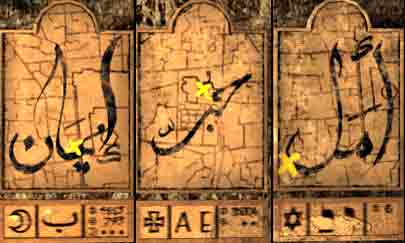 Adrian asks the calligrapher to place the crosses on the words that he has just written in the boxes. Adrian asks the calligrapher to place the crosses on the words that he has just written in the boxes.
Look at the triptych. The crosses might mark imprtand places..
Click at the left cross and Ozdemir says it is the Tankyzzija madrassa, one of the most important Koranic schools in Jerusalem.
Click at the middle cross and you'll learn it is the Holy Sepulchre. The place where the son of Mary was placed after his Crucifixion
Click at the right Cross and Ozdemir says that it indicates the Ramban Synagogue.
The Council Chamber
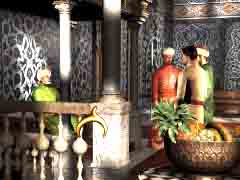 They go together to warn the governor and Ozdemir tells him that Adrian has found that the madman's drawings indicates three sites in Jerusalem. They go together to warn the governor and Ozdemir tells him that Adrian has found that the madman's drawings indicates three sites in Jerusalem.
The governor answers: "You seem to be gifted with wisdom secretary.
I bestow my honour as governor in your hands. Find Abraham dagger for me and above all find my daughter."
When they are alone again. Ozdemir asks Adrian what he was looking for in the desert. When Adrian tells him he was looking for a woman Ozdemir thinks that is a sign from Allah that he now is looking for another lost woman and Adrian agrees that he has had the same thoughts.
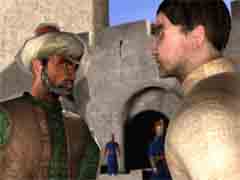 Outside the Garrison Outside the Garrison
Adrian must now continue his investigations on it own and Ozdemir fears that this is only the beginning of a long trail. He gives Adrian some aspres (money) and a map of the city and tells him to be careful.
"What could happen to me," says Adrian, "I am walking on the path of faith".
"Be doubly careful then," answers Ozdemir, "for that is when Shaitan captures his best prey."
|